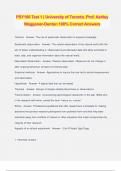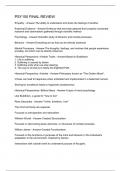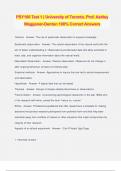PSY100 Study guides, Class notes & Summaries
Looking for the best study guides, study notes and summaries about PSY100? On this page you'll find 9 study documents about PSY100.
All 9 results
Sort by

-
PSY100 Test 1 | University of Toronto, Prof. Ashley Waggoner-Denton 100% Correct Answers
- Exam (elaborations) • 26 pages • 2024
-
- $12.49
- + learn more
understand the mind as a whole. Focused on describing what happens in the minds of individuals. Structuralism - Answer- An early school of psychology that used introspection to explore the elemental structure of the human mind. Functionalism - Answer- A school of psychology that focused on how our mental and behavioral processes function - how they enable us to adapt, survive, and flourish. Its biggest proponent was William James, who was heavily influenced by Darwin. Gestalt theory - Ans...

-
PSY100 Midterm #1 UofT Exam Questions and Answers 100% Pass
- Exam (elaborations) • 22 pages • 2024
-
- $13.49
- + learn more
PSY100 Midterm #1 UofT Exam Questions and Answers 100% Pass Empiricism - Answer- The view that knowledge comes from observed/sensory experience Empirical evidence - Answer- Refers to the data that has been collected (or the knowledge that has been gained) by scientific observation What is the role of theories? - Answer- Scientific theories typically explain the relationship between two or more variables. What must scientific theories be? - Answer- Testable, falsifiable, parsimonious Wha...

-
PSY100 FINAL REVIEW
- Other • 23 pages • 2024
-
- $12.99
- + learn more
Empathy - Answer-The ability to understand and share the feelings of another Empirical Evidence - Answer-Evidence that has been gleaned from properly-conducted research and observations gathered through scientific method Psychology - Answer-Scientific study of behavior and mental processes Behavior - Answer-Everything we do that can be directly observed Mental Processes - Answer-The thoughts, feelings, and motives that people experience privately, but which can be directly observed ...

-
PSY100 Test 1 | University of Toronto, Prof. Ashley Waggoner-Denton 100% Correct Answers
- Exam (elaborations) • 26 pages • 2024
-
- $12.49
- + learn more
PSY100 Test 1 | University of Toronto, Prof. Ashley Waggoner-Denton 100% Correct Answers Science - Answer- The use of systematic observation to acquire knowledge. Systematic observation - Answer- The careful observation of the natural world with the aim of better understanding it. Observations provide basic data that allow scientists to track, tally, and organize information about the natural world. Naturalistic Observation - Answer- Passive observation. Observers do not change or alter o...

-
PSY100 Midterm #1 UofT Exam Questions and Answers 100% Pass
- Exam (elaborations) • 22 pages • 2024
-
- $13.49
- + learn more
PSY100 Midterm #1 UofT Exam Questions and Answers 100% Pass Empiricism - Answer- The view that knowledge comes from observed/sensory experience Empirical evidence - Answer- Refers to the data that has been collected (or the knowledge that has been gained) by scientific observation What is the role of theories? - Answer- Scientific theories typically explain the relationship between two or more variables. What must scientific theories be? - Answer- Testable, falsifiable, parsimonious Wha...

-
PSY100 Test 1 | University of Toronto, Prof. Ashley Waggoner-Denton 100% Correct Answers
- Exam (elaborations) • 26 pages • 2024
-
- $13.49
- + learn more
PSY100 Test 1 | University of Toronto, Prof. Ashley Waggoner-Denton 100% Correct Answers Science - Answer- The use of systematic observation to acquire knowledge. Systematic observation - Answer- The careful observation of the natural world with the aim of better understanding it. Observations provide basic data that allow scientists to track, tally, and organize information about the natural world. Naturalistic Observation - Answer- Passive observation. Observers do not change or alter o...

-
PSY100 Midterm #1 UofT Exam Questions and Answers 100% Pass
- Exam (elaborations) • 22 pages • 2024
-
- $13.49
- + learn more
PSY100 Midterm #1 UofT Exam Questions and Answers 100% Pass Empiricism - Answer- The view that knowledge comes from observed/sensory experience Empirical evidence - Answer- Refers to the data that has been collected (or the knowledge that has been gained) by scientific observation What is the role of theories? - Answer- Scientific theories typically explain the relationship between two or more variables. What must scientific theories be? - Answer- Testable, falsifiable, parsimonious Wha...
PSY100 Midterm Exam |100 Questions| Already Passed!!

-
PSY100 EXAM QUESTIONS WITH COMPLETE SOLUTIONS
- Exam (elaborations) • 3 pages • 2023
-
- $9.49
- + learn more
PSY100 EXAMIn his study of obedience, Stanley Milgram found that the majority of participants - ANSWER complied with all the demands of the experiment According to cognitive dissonance theory, dissonance is most likely to occur when - ANSWER an individual does something that is personally disagreeable A group that is like-minded with likely - ANSWER not change their opinions throughout the discussion Asch's study of conformity showed that conformity increased when - ANSW...




